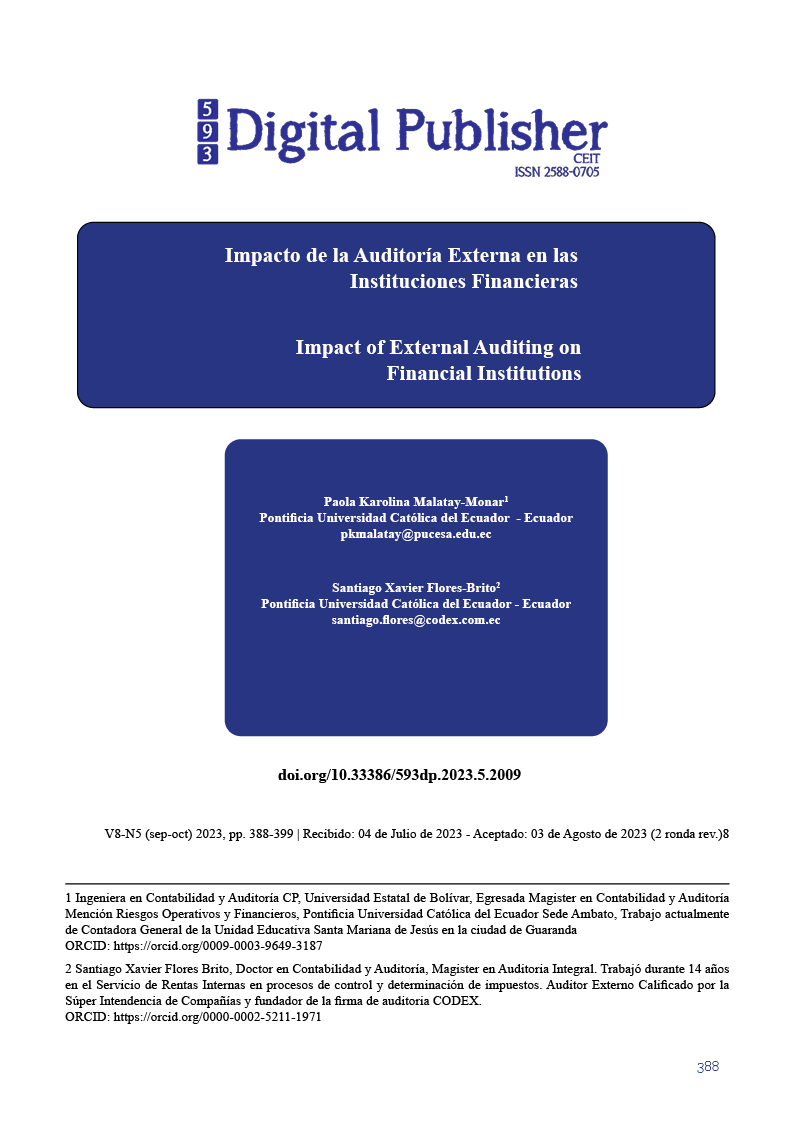Impact of External Auditing on Financial Institutions
Main Article Content
Abstract
The latent uncertainty of suffering risks and detrimental results in the operations carried out by financial institutions is an impediment to meet the proposed objectives, which is why there is a need to incorporate external audits in which different criteria can be known and applied by independent people to the company. For this reason, external audits have reached a higher level of importance in recent years of pandemic, where the leaders of financial institutions seek to identify the critical points of the company and the emerging risks to which they are exposed, in order to establish an adequate control in real time. In this context, the objective of the research was to evaluate the impact of external audits on the reduction of negative accounting-financial results. Taking as a case study the financial institutions of the city of San José de Chimbo, Chimbo canton, province of Bolivar, Ecuador. Regarding the methodological scope, non-experimental research was used, with a mixed approach, by means of descriptive and correlational methods, which allowed to approach the reality of the object of study, through research techniques and instruments. The results focused on the normative basis, measuring the impact, and determining the variables that influence the negative accounting-financial results within financial institutions in order to minimize them, thus providing a coherent answer to the research question. In conclusion, the external audit is a tool that has a positive impact on financial institutions since it seeks to predict financial failure.
Downloads
Article Details

This work is licensed under a Creative Commons Attribution-NonCommercial-ShareAlike 4.0 International License.
1. Derechos de autor
Las obras que se publican en 593 Digital Publisher CEIT están sujetas a los siguientes términos:
1.1. 593 Digital Publisher CEIT, conserva los derechos patrimoniales (copyright) de las obras publicadas, favorece y permite la reutilización de las mismas bajo la licencia Licencia Creative Commons 4.0 de Reconocimiento-NoComercial-CompartirIgual 4.0, por lo cual se pueden copiar, usar, difundir, transmitir y exponer públicamente, siempre que:
1.1.a. Se cite la autoría y fuente original de su publicación (revista, editorial, URL).
1.1.b. No se usen para fines comerciales u onerosos.
1.1.c. Se mencione la existencia y especificaciones de esta licencia de uso.
References
Asamblea Nacional. (2022). Código Orgánico Monetario y Financiero. https://www.seps.gob.ec/wp-content/uploads/CO%CC%81DIGO-ORGA%CC%81NICO-MONETARIO-Y-FINANCIERO.pdf
BANECUADOR. (2016). Programa de Educación Financiera. El Sistema Financiero Nacional y el rol de la Superintendencia de Bancos. https://www.banecuador.fin.ec/wp-content/uploads/2022/04/Mo%CC%81dulo-3-Sistema-financiero-nacional.pdf
Camacho-Miñano, M. del M., Muñoz-Izquierdo, N., Pincus, M., & Wellmeyer, P. (2023). Are key audit matter disclosures useful in assessing the financial distress level of a client firm? The British Accounting Review, 101200. https://doi.org/10.1016/J.BAR.2023.101200
Choi, J. H., Kim, S., Yang, D. H., & Cho, K. (2021). Can Corporate Social Responsibility Decrease the Negative Influence of Financial Distress on Accounting Quality? Sustainability 2021, Vol. 13, Page 11124, 13(19), 11124. https://doi.org/10.3390/SU131911124
Clavería-Navarrete, A. C. (2020). La auditoría externa contable como herramienta para detectar problemas financieros en las empresas. Polo Del Conocimiento, 5(9), 382–395. https://doi.org/10.23857/pc.v5i9.1697
Deepal, A. G., & Jayamaha, A. (2022). Audit expectation gap: a comprehensive literature review. Asian Journal of Accounting Research, 7(3), 308–319. https://doi.org/10.1108/AJAR-10-2021-0202/FULL/PDF
El Badlaoui, A., Cherqaoui, M., & Taouab, O. (2021). Output Indicators of Audit Quality: A Framework Based on Literature Review. Universal Journal of Accounting and Finance, 9(6), 1405–1421. https://doi.org/10.13189/UJAF.2021.090619
Hermann, K., Salazar-Arrieta, F., Garzón, H. A., & Rodríguez, B. A. (2020). Efficient tax administration for access to global supply chains by the automotive sector in Colombia: an accounting vision. Informacion Tecnologica, 31(6), 27-41. https://doi.org/10.4067/S0718-07642020000600027
Herrero, E. (2023). Las limitaciones en auditoría pública - Asocex. https://asocex.es/las-limitaciones-en-auditoria-publica/
Jan, C. L. (2021). Financial Information Asymmetry: Using Deep Learning Algorithms to Predict Financial Distress. Symmetry 2021, Vol. 13, Page 443, 13(3), 443. https://doi.org/10.3390/SYM13030443
Mavlutova, I., Babenko, V., Dykan, V., Prokopenko, N., Kalinichenko, S., & Tokmakova, I. (2021). Business Restructuring as a Method of Strengtening Company’s Financial Position. Journal of Optimization in Industrial Engineering, 14(Special Issue), 105–115. https://doi.org/10.22094/JOIE.2020.677839
Muñoz-Izquierdo, N., Segovia-Vargas, M. J., Camacho-Miñano, M.-M., & Pascual-Ezama, D. (2019). Explaining the causes of business failure using audit report disclosures. Journal of Business Research, 98, 403–414. https://doi.org/10.1016/j.jbusres.2018.07.024
Nguyen, H. T., & Nguyen, A. H. (2020). Audit Expectation Gap: Empirical Evidence from Vietnam. The Journal of Asian Finance, Economics and Business, 7(5), 51–60. https://doi.org/10.13106/JAFEB.2020.VOL7.NO5.051
Pucha-Medina, P. M., Muyulema-Allaica, J. C., Burgos-Arcos, C. L., & Buenaño-Buenaño, E. N. (2019). Gestión de la calidad como estructura del desempeño operacional en el sector Cooperativo Financiero del segmento cinco de la provincia de Chimborazo. Dilemas Contemporaneos-Educacion Politica Y Valores, 2(78), 1-28.
Rodríguez-López, M., Piñeiro-Sánchez, C., De, P., & Monelos, L. (2014). Determinación del riesgo de fracaso financiero mediante la utilización de modelos paramétricos, de inteligencia artificial, y de información de auditoría* Financial risk determination of failure by using parametric model, artificial intelligence and audit information. Estudios de Economía, 41, 187–217.
SEPS. (2015). Resolución No. SEPS-ISFPS-INEPS-IGPJ-2015-155. https://www.seps.gob.ec/wp-content/uploads/Resolucion-SEPS-ISFPS-INEPS-IGPJ-2015-155b.pdf
SEPS. (2022). Resolución Nro. SEPS-INSEPS-AE-SFPS-2022-00019. https://www.juanpiodemora.fin.ec/wp-content/uploads/2022/06/estatuto-vigente-aprobado-por-la-SEPS.pdf
SEPS. (2023a). Resolución No. SEPS-IGT-IGS-INR-INGINT-INSESF-2023-008 JORGE (Vol. 00).
SEPS. (2023b, May 29). Superintendencia de Economía Popular y Solidaria. Catastro de Las Organizaciones Activas Del Sistema Financiero Popular y Solidario. https://servicios.seps.gob.ec/gosf-internet/paginas/consultarOrganizaciones.jsf
Sidhu, A. V., Jain, P., Singh, S. P., Kanoujiya, J., Rawal, A., Rastogi, S., & Bhimavarapu, V. M. (2023). Impact of Financial Distress on the Dividend Policy of Banks in India. Journal of Risk and Financial Management 2023, Vol. 16, Page 107, 16(2), 107. https://doi.org/10.3390/JRFM16020107
Ugarteche-Galarza, O., & Segovia-Villeda, L. D. (2016). Triple arbitraje, expectativas y crecimiento económico. Economía UNAM, 13(38), 61-95. https://doi.org/10.1016/j.eunam.2016.05.003
Voda, A. D., Dobrotă, G., Țîrcă, D. M., Dumitrașcu, D. D., & Dobrotă, D. (2021a). Corporate bankruptcy and insolvency prediction model. Technological and Economic Development of Economy, 27(5), 1039–1056. https://doi.org/10.3846/TEDE.2021.15106
Voda, A. D., Dobrotă, G., Țîrcă, D. M., Dumitrașcu, D. D., & Dobrotă, D. (2021b). Corporate bankruptcy and insolvency prediction model. Technological and Economic Development of Economy, 27(5), 1039–1056. https://doi.org/10.3846/TEDE.2021.15106



